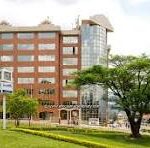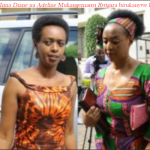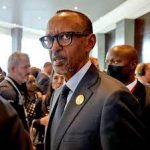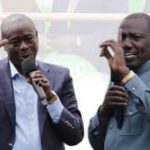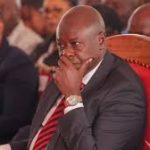UN accused of flip-flopping as it promises free passage for rebel delegation Sanctions imposed by the UN Security Council on groups opposed to President Joseph Kabange Kabila threaten to scuttle on-going peace talks in Kampala and lead to renewed fighting
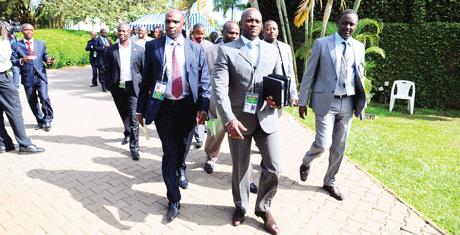
Sanctions imposed by the UN Security Council on groups opposed to President Joseph Kabange Kabila threaten to scuttle on-going peace talks in Kampala and lead to renewed fighting in eastern DR Congo.
The UN on December 31, 2012 imposed sanctions on M23 commander, Lt. Col. Eric Badege and Jean-Marie Lugerero Runiga, the president of M23 accusing them of targeting children and women in situations of armed conflict.
Runiga has been a central figure in the talks and met with President Kabila on November 24, 2012 in Kampala under the aegis of the International Conference on the Great Lakes Region (ICGLR).
The UN has also imposed sanction on the Democratic Forces for the liberation of Rwanda (FDLR) and M23 for allegedly targeting women and children for killing, sexual crimes, and forced displacement.
Uganda’s Defence Minister, Dr Crispus Kiyonga, who is the Facilitator of peace talks between the DR Congo government and the M23 rebels at the Munyonyo Resort on the shores of Lake Victoria in Kampala, is unhappy about the sanctions which he calls “disruptive”.
Bertrand Bisimwa, the M23 spokesman is also unhappy about the UN sanctions.
“We cannot understand why the UN would want to get people fighting; people who are talking because what these sanctions have done is break our hearts and encourage the DRC government to go back to war,” Bisimwa told The Independent on Jan. 12.
Kiyonga, Bisimwa and others are unsure about the UN’s motives in imposing the sanctions. Bisimwa says an asset freeze and a travel ban that the UN Security Council imposed on M23 as a group and their chairman, Runiga, has got many wondering how it takes forward the efforts to restore peace in eastern Congo.
“We are shocked to see the UN twisting the arms of the ICGLR leaders and attempting to fail them from bringing peace to Congo,” Bisimwa says.

UN versus regional leaders
For some observers, the clearest sign of the contestation for supremacy in DRC between regional leaders and the UN was the move by the UN to bundle M23 in the same boat as the Forces Democratiques De Liberation Du Rwanda (FDLR), a group that Rwanda accuses of being behind the 1994 Genocide. Essentially, the UN was saying that M23 is as illegitimate as FDLR and therefore those that seek to fight FDLR, like Rwanda, should view M23 through the same lens. Such a move, observers say, reverses progress made by regional presidents in Kampala in November under the ICGLR summit. It is a contradiction of what the regional presidents agreed and what the UN itself welcomed at the time; recognition of M23 and agreement to address its grievances through talks.
The UN appears to be undermining the ICGLR, which is an inter–governmental organisation established in 2006 by the heads of 11 states under the auspices of the United Nations and the African Union. ICGLR members include Angola, Burundi, CAR, DRC, Republic of Congo, Kenya, Rwanda, Sudan, Uganda, Tanzania, and Zambia.
When asked whether the sanctions might be as a result of a contestation between the regional leaders and the international community over who is more influential in Congo, Henry Okello Oryem, the state minister for Foreign Affairs was diplomatic.
“We are not ruling out anything,” he said.
Fighting in the region escalated last year after the U.S. leveled sanctions against Col. Sultan Makenga, the military head of M23, accusing him of “extensive atrocities against the population in the DRC, including the recruitment of child soldiers”. It was as if the imposition of sanctions was a signal to the rebels to double their energies as they took over eastern Congo like a wild fire.
This time M23 Spokesperson Bisimwa says Congolese are “tired of war and we are tired of sanctions that break the process of peace”. “All we are looking for is peace,” he says, “We want Congo to be secure and we want a vision for our country and our prayer is that the UN does not stand in our way.”
Bisimwa says unfortunately, the international community seems to have other interests.
“We have appealed to the international community to come and find out the truth but they keep using the wrong information, what does that say?” Bisimwa asked, “Because, if they [UN] came on the ground they would realise that none of what they say is true.”
The UN panel of experts appears to depend mainly on news clips from European newspapers like LA Figaro and The Guardian.
Bisimwa wondered what observers of the peace negotiations in Kampala from Belguim, France, US, UK among others report to the UN considering its recent sanctions. “When we are negotiating,” Bisimwa said, “these observers are always there with us, what do they report to the UN if it does not realise that we are involved in seeking peace?”
Eastern Congo has been ripped by war ever since rebels that call themselves M23 mutinied from the Congolese army protesting failure by President Kabila’s government to honour the March 23 2009 agreement from which they derive their name.
The UN, which has come under fire for failing to restore peace in the eastern DRC, blames neighbours Rwanda and Uganda of frustrating its efforts by allegedly aiding the M23 militarily and with logistics to fight the forces of President Kabila.
Late last November, when the rebel took over Goma the capital of northern Kivu, the UN came under pressure to withdraw the 17,000-strong MUNUSCO (United Nations Organization Stabilization Mission in the DR Congo) force. Critics wondered what MUNUSCO was doing in eastern Congo if just a months-old ragtag rebel group of fewer than 15000 fighters could take over the region in a matter of days under their watch. Several Congolese including university students called for the MUNUSCO force to quit Congo.
According to some of observers, the UN sanctions are a sign of the international community decision to offload their frustration onto the rebels and show who-is-boss to the regional players.
These sanctions follow several media and the UN group of experts report alleging that Rwanda directly supported the rebels. Although Rwanda refuted the report in a systematic rebuttal, the UN never dropped it. Similar accusations on Uganda were ignored when the country threatened to withdraw its peace-keeping missions across the region.
At the height of the M23 onslaught on Goma, regional leaders, specifically President Museveni and Rwanda’s Paul Kagame said the UN should give them the US$1.5 billion spent on its peace-keeping force, MUNUSCO, and they would end rebellion in Congo since the UN had failed. The UN response was clear: MUNUSCO was going nowhere. Instead, in the latest we-are-here-for-the-long-haul signal from the UN was an announcement to deploy drones for intelligence gathering to make MUNUSCO more effective.
Rwanda expressed its disagreement right away and Uganda is expected to follow according to Minister Oryem.
“Uganda will also refuse the drones,” Oryem told The Independent, “Because they are not limited, they can detect miles away, so if they are on the DRC-Ugandan boarder, they can see things in Uganda and therefore intrude on our privacy and the UN has not endorsed the use of drones, there are no policies on the use of drones.”
UN flip-flop
Kiyonga says he has consulted the UN and USA over the sanctions and that his understanding is that the sanctions do not affect the dialogue.
“The two parties [UN and USA] assured us that for as long as no member of the delegation has been sanctioned (which is the case for now),” Kiyonga said, “they supported the dialogue.”
He added that in case they need one of the sanctioned members to take part in the negotiations, the UN and USA had still agreed that they would grant them an exemption for the member to travel and attend the talks.
Kiyonga has also announced the agenda for the peace talks which includes reviewing the peace agreement of 23 March 2009, security matters, social, political and economic matters and mechanisms for the implementation-monitoring and evaluation of the Kampala Agreement.
To him, the UN sanctions were a result of “incoordination and differences of opinion”.
“For us as Uganda and the region we follow the four points in this order; peace first, reconciliation, democracy and justice but some people in the international community put justice first, we have agreed to disagree on that.”
Junior minister Oryem had earlier told The Independent that the sanctions are against the principal of reconciliation.
“We are saying that let us talk but by blocking the talks you are creating room for fighting,” he said.
Other sources privy to the diplomatic maneuvering surrounding the UN sanctions told The Independent that the M23 rebels also pulled the rug under the DRC government by announcing a unilateral cease-fire.
“It took away any pretext for DRC to pull out of talks,” the source said. The rebels had earlier at a press conference in Bunagana on Jan.3 threatened to pull out of talks if Kinshasa refused to sign cease-fire
But the Defence Ministry spokesperson, Lt. Col. Paddy Ankunda, who works closely with the facilitator says that the “two teams have no option, without peace, they are both losers”.
Since weaker forces than M23 pillage Congo and maintain a steady supply of arms—including from MUNUSCO forces in exchange for minerals—despite UN sanctions and arms embargoes as old as 2003, it is not clear how the UN would deal with a strong rebel group like M23.
Since April last year when they mutinied, M23 have captured large swathes of mineral rich eastern Congo including its capital Goma, from which they exited following calls by the regional presidents, who were pressed by the international community, with a previously defiant Kabila agreeing to talks with them.
UN Secretary General Ban Ki-moon had personally telephoned President Museveni to reign in the rebels. Similar contact was made with Rwanda’s Paul Kagame. Following a presidential summit, Kabila agreed to talks and the international community assured the regional presidents that they were in full support of the talks.
But in order to get the rebels to talk, the presidents including Kabila agreed to look into the M23 grievances and the group was elevated to an equal player in the peace process. However, as they were returning to resume the talks that began in December 2011, the Security Council announced the sanctions which have opened up the likelihood of a resumption of fighting.
“The UN knows that we come here (Kampala) to seek peace, so by blocking us from travelling, then they are calling for war to resume,” says M23 spokesman Bertrand Bisimwa.







